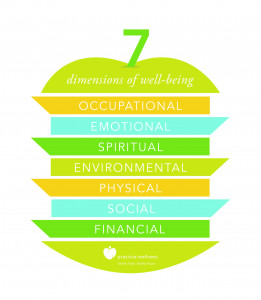 Well-being is more than simply the absence of disease. It is the full integration of social, emotional, spiritual, environmental, occupational, intellectual and physical wellness. These seven dimensions act, and interact, in a way that contributes to the overall quality of life.
Well-being is more than simply the absence of disease. It is the full integration of social, emotional, spiritual, environmental, occupational, intellectual and physical wellness. These seven dimensions act, and interact, in a way that contributes to the overall quality of life.
Over the next few issues of the NCMS Bulletin, Jason Horay, MS, ATC, CHES, the NCMS Plan Health Promotion Coordinator, will take you on a journey through each aspect of well-being, offering personal reflections and examples of ways to enhance each dimension within your workplace, community, and at home.
We encourage you to share this content with colleagues using social media and to share your ideas and personal experiences for enhancing your well-being by posting comments to the blog.
The next installment focuses on emotional well-being.
Emotional Well-Being, by Jason Horay, MS, ATC, CHES
Emotional well-being is the ability to understand ourselves and cope with the challenges life can bring. The ability to acknowledge and share feelings of anger, fear, sadness, or stress/hope, love, joy, or happiness in a productive manner contributes to our emotional well-being.
Being emotionally well is more than just handling stress. It also involves being attentive to your thoughts, feelings, and behaviors, whether positive or negative. My wife gave me an incredible gift this Christmas that has allowed me to become more aligned with my feelings and cope with personal challenges. The Start Where You Are: A Journal for Self-Exploration has helped me navigate the confusion and chaos of daily life by reminding me that by knowing ourselves and our dreams, we can appreciate the world around us and take the appropriate steps to achieve our dreams. Continuing to work on my own emotional well-being has helped me become more aware and accepting of my own feelings, rather than denying them. It has also allowed me to take a more optimistic approach to life, and enjoy life despite its occasional disappointments and frustrations.
Below are some additional examples of how to enhance your emotional well-being throughout the day:
At Work
- Participate in mindful meditation and deep breathing
- Seek out your employer’s Employee Assistance Program (EAP)
- Invite a co-worker to lunch
- Enroll in a stress management course
In the Community
- Connect with nature
- Download a stress management/resilience app to your mobile device
- Participate in a yoga or fitness class
With your Family
- Use journaling as a method of reflection
- Enroll in relationship counseling
- Sing or practice music therapy
- Read
- Light candles contributing to a peaceful environment
